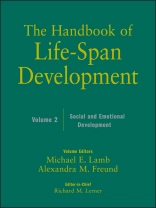In the past fifty years, scholars of human development have been moving from studying change in humans within sharply defined periods, to seeing many more of these phenomenon as more profitably studied over time and in relation to other processes. The Handbook of Life-Span Development, Volume 2: Social and Emotional Development presents the study of human development conducted by the best scholars in the 21st century. Social workers, counselors and public health workers will receive coverage of the social and emotional aspects of human change across the lifespan.
Table of Content
VOLUME II: Social and Emotional Development.
Handbook Preface (Richard M. Lerner Tufts University).
1. Introduction: Social and Emotional Development across the Life Span (Alexandra M. Freund University of Zurich, Michael Lamb University of Cambridge).
2. Neurobiological Bases of Social Behavior across the Life Span(Stephen W. Porges and C. Sue Carter University of Illinois at Chicago).
3. The Development of Emotion Regulation: A Neuropsychological Perspective (Marc D. Lewis, Rebecca Todd, and Xiaowen Xu Universityof Toronto).
4. Dynamic Integration of Emotion and Cognition: Equilibrium Regulation and Development (Gisela Labouvie-Vief University of Geneva, Daniel Grühn North Carolina State University, Joseph Studer University of Geneva).
5. Self-Regulation across the Life Span (G. John Geldhof, Todd D. Little, and John Colombo University of Kansas).
6. Self and Identity across the Life Span (Dan P. Mc Adams and Keith S. Cox Northwestern University).
7. Temperament and Personality through the Life Span (John E.Bates, Alice C. Schermerhorn, and Jackson A. Goodnight Indiana University).
8. Life-Span Perspectives on Positive Personality Development in Adulthood and Old Age (Ursula M. Staudinger and Catherine Bowen Jacobs University Bremen).
9. Coping across the Life Span (Carolyn M. Aldwin Oregon State University, Loriena A.Yancura University of Hawai’i, Manoa, Daria K. Boeninger Arizona State University).
10. Gendered Behavior across the Life Span (Melissa Hines University of Cambridge).
11. Intimate Relationships across the Life Span (Lisa M.Diamond, Christopher P. Fagundes, and Molly R. Butterworth University of Utah).
12. Convoys of Social Relations: Integrating Life-Span and Life-Course Perspectives (Toni C. Antonucci University of Michigan, Katherine L. Fiori Adelphi University, Kira Birditt and Lisa M. H.Jackey University of Michigan).
13. Achievement Motives and Goals: A Developmental Analysis(Andrew J. Elliot University of Rochester, David E. Conroy The Pennsylvania State University, Kenneth E. Barron James Madison University, Kou Murayama Tokyo Institute of Technology).
14. Developmental Psychopathology (Dante Cicchetti University of Minnesota).
15. Developing Civic Engagement within a Civic Context Jonathan F. Zaff America’s Promise Alliance (Daniel Hart Rutgers, the State University of New Jersey, Constance A. Flanagan The Pennsylvania State University, James Youniss Catholic University of America, Peter Levine Tufts University).
16. Religious and Spiritual Development across the Life Span: ABehavioral and Social Science Perspective (W. George Scarlett and Amy Eva Warren Tufts University).
About the author
Richard M. Lerner is the Bergstrom Chair in Applied Developmental Science and the Director of the Institute for Applied Research in Youth Development in the Eliot-Pearson Department of Child Development at Tufts University. A developmental psychologist, he has been a fellow at the Center for Advanced Study in the Behavioral Sciences and is a fellow of the American Association for the Advancement of Science, the American Psychological Association, and the American Psychological Society. Lerner is the author or editor of 65 books and more than 450 scholarly articles and chapters.
Michael E. Lamb is Professor of Psychology in the Social Sciences at the University of Cambridge and previously served as Head of the Section on Social and Emotional Development at the National Institute of Child Health and Human Development near Washington DC. He He has written several hundred professional publications on social and emotional development, especially in infancy and early childhood.
Alexandra M. Freund is a Professor of Psychology at the University of Zurich. Together with Paul B. Baltes in Berlin at the Max Planck Institute for Human Development, she started and co-directed the project ‘Personal Goals in Lifespan Development’ in 2002-2003. Her recent publications are primarily concerned with the development of motivational process in adulthood.












